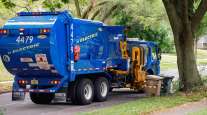Senior Reporter
US House Lawmakers Introduce EV Tech Bill

[Stay on top of transportation news: Get TTNews in your inbox.]
Legislation designed to promote research and development programs for vehicle technologies at the U.S. Department of Energy was recently introduced in the U.S. House of Representatives.
The Shifting Forward Vehicle Technologies Research and Development Act, which aims to ensure domestic competitiveness in the electric vehicles industry, was sponsored by Michigan Democratic Reps. Haley Stevens and Debbie Dingell.
“The future of America’s auto industry and Michigan’s economy depends on our nation’s ability to compete in the global transition to clean transportation,” Stevens said Sept. 28, emphasizing provisions related to vehicle fueling and energy storage, as well as workforce development. She is the chairwoman of the Research and Technology Subcommittee.

Dingell
“I am thrilled to introduce this legislation that positions Michigan at the center of unlocking solutions that ultimately lead us all to a safer, more affordable, and cleaner mobility future,” she went on.
“Innovation is a core strength of the United States —and robust investments in [research and development] makes this possible,” added Dingell, a member of the Energy and Commerce Committee. “If America and our domestic automotive industry is to remain a global leader in vehicle technologies and future mobility, we must continue to empower our greatest minds, our greatest companies, and our greatest workforce to collaborate and develop the advanced manufacturing processes and vehicles of the future while combating the climate crisis and ensuring affordability for consumers.”
The bill aims to resolve connectivity concerns across supply chains and facilitate the adoption of transformational technologies throughout mobility networks, its sponsors argued. The legislation was directed to a committee of jurisdiction.
The bill also would establish the Graduate Automotive Technology Education Centers of Excellence for research and development. It would pursue enhancements for vehicle batteries to expedite charging and wireless charging capabilities. The bill would identify the efficient use, substitution and recycling of certain materials in vehicles, and it would seek to advance biofuel technologies, according to background the lawmakers provided.

Stevens
The bill gained endorsements from American Trucking Associations, the American Automotive Policy Council, Third Way, the North Carolina Clean Energy Technology Center and the Alliance for Automotive Innovation. John Bozzella, president and CEO of the Alliance for Automotive Innovation, said in a statement accompanying the bill’s introduction: “This is a smart strategy to leverage government [research and development] resources to develop the transformative transportation, infrastructure and fuel innovations that will help define next-generation mobility.”
Matt Blunt, president of the American Automotive Policy Council, added: “This legislation provides another important tool for the United States as it looks to harness the power of advanced vehicle technologies to help ensure the materials American automakers need are more available domestically.”
Over the summer, Dingell and Rep. Bob Latta (R-Ohio) launched the Congressional Autonomous Vehicle Caucus. The caucus is meant to promote autonomous vehicle policies in Congress to support the passage of comprehensive legislation. “We must ensure our nation is engaging all stakeholders, making bold investments and working across the aisle to get the necessary policies right to support the safe deployment of autonomous vehicles,” Dingell said Aug. 8.
Want more news? Listen to today's daily briefing below or go here for more info:




